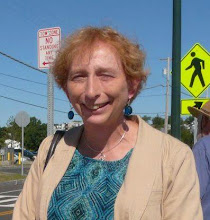BTW—I’m calling it the “non-crime” as charges were dropped.
The Scene of the Non-Crime
First I walked past the house at night. Between the street light spacing and the canopy of the trees lining the street, it is exceptionally dark in from of the house.
 Perhaps, if it were better lit, there might not have been a report of a crime. Many other residences in the area (see photo at right) have well-lit front doorways, and there would be less suspicion about what is going on. Seeing two men try to force a dark doorway off a dark street might cause many a person to call 911.
Perhaps, if it were better lit, there might not have been a report of a crime. Many other residences in the area (see photo at right) have well-lit front doorways, and there would be less suspicion about what is going on. Seeing two men try to force a dark doorway off a dark street might cause many a person to call 911.The Socioeconomics of the Scene of the Non-Crime
The Professor lives in the most prestigious zip code in our fair city of Cambridge. In 02138, single family homes begin at well over $1 million. To me, the scene of the non-crime involved real estate that could go for something in the $1 to $2 million range. This is socioeconomically distant from the neighborhoods with the higher percentages of minority residents.
So, here’s some questions:
- If two black men were forcing a door in a poor minority neighborhood, would it have been less likely that someone would have called the police?
- If two white men were forcing a door in a well-lit area of my middle class neighborhood, would someone first ask what’s going on before calling the police?
Here my thought is that the more wealthy the neighborhood, the more likely the call to the police.
The Socioeconomics Setting of Racial Profiling
At first one might expect more racial profiling to occur where minorities live. But is that true?
I’ve read that there are many incidents of citizen and/or police profiling in the richer non-minority communities. In these areas, there may be a greater assumption of “what are you doing here” when say a minority person (particularly a man) is seen in a very wealthy white neighborhood.
I’ve heard stories of minority municipal workers and others with legitimate business purposes stopped and questioned in some of the richer suburbs of Boston for little more than “working while being black.”
So here’s the irony: it’s a wealthy neighborhood, but this is the black man’s house. And it’s the owner that is being questioned.
Was It Racial Profiling?
This is the charged question and some will say “yes” and other will say “no.”
At first I suspected that the caller to 911 called because she could see the race of the men forcing the door. But she said she couldn’t tell, and having seen the lighting at the scene, I’d agree that it would be hard to determine skin color in the poor lighting.
Still, if you were Prof. Gates in your own home with the cops asking you to identify yourself, I think you’d be saying to yourself “This would not be happening if I were white!”
And then: “If this is happening to me, a Harvard professor, what is going on when police stop other black men who do not are not from such a privileged status?”
On the other side are the police who say they followed procedures. But do these procedures work?
Standard Operating Procedures Don’t Guarantee the Desired Outcome
Standard operating procedures (SOPs) can be a good thing in a business, in manufacturing or even in law enforcement. When there are so many possible choices, SOPs can narrow the range of decisions that need to be made.
Police SOPs can attempt to take prejudices out of the discretion that law enforcement officers have. In this case, it seems that Sgt. Crowley followed the proper procedures. In other words, there is no basis to criticize his actions.
But, we still had a controversial outcome.
The Irony of a Racial Confrontation in the Most Liberal City in Massachusetts
Some have pointed out of the irony of a racial incident in the most liberal city in Massachusetts. This is as though “liberal” or “progressive” meant “post-racial.”
So, perhaps there is an expectation that “this kind of thing doesn’t happen here.” Might this be a thought in Prof. Gates’ mind: “How can this be happening in Cambridge?” Maybe his anger was in part from the incredulity of the situation.
A couple of additional thoughts:
- Latent racism exists in even the most progressive communities and individuals (including me).
- Prejudice and segregation took longer to be routed out in “more liberal” northeast than in the “more conservative” south.
- The local politicians, though quite liberal, have been unusually reticent, restrained and balanced in their comments. While I had expected a strong outpouring in support of Prof. Gates and maybe the sacking of the police commissioner, instead, the local response has been quite mild.
My Conclusion
The bottom line for me is that this shouldn’t have happened.
Not that the police can be faulted for following procedures. But sometimes, the best outcome involves a little more discretion and a little less simply following standard procedures.
Though the professor may have been highly agitated and upset, my preferred outcome would have been for the police to leave him alone once his identity was determined.



No comments:
Post a Comment